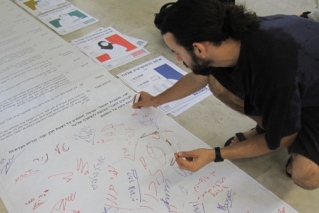 Signing the proposed Basic Law at the Social Congress
Signing the proposed Basic Law at the Social CongressMembers of Knesset from the coalition and the opposition have joined forces to support a new Basic Law that seeks to grant constitutional status to social rights.
The proposed Basic Law: Social Rights seeks to grant a clear constitutional status to a series of social rights: the right to a dignified living, the right to housing, the right to nutritional security and access to water, the right to health, education, employment, and so forth. Unlike similar proposals tabled in the past, the current proposal includes extensive details regarding each of the concrete rights and defines their content, in order to obligate the authorities to act in a manner that secures these rights.
The proposed law, which was drafted with the assistance of the Association for Civil Rights in Israel (ACRI), was tabled by Members of Knesset from a variety of coalition and opposition factions: MKs Shelly Yachimovich, Zevulun Orlev, Haim Katz, Orly Levy, Shlomo Molla, Zahava Gal-On, Nitzan Horowitz, Dov Khenin, Eitan Cabel, and Uri Orbach. The proposed Basic Law was discussed in a special Knesset conference on December 6, marking International Human Rights Day. The conference was organized by ACRI and by MK Zahava Gal-On (Meretz) and attended by members of all the factions in the Knesset. The conference was opened by Knesset Speaker Reuven Rivlin and Minister for the Development of the Negev and Galilee, Silvan Shalom. Former Supreme Court Justice Ayala Procaccia spoke at the conference in her first public appearance after retiring from the bench.
Attorney Tali Nir, Director of ACRI’s Social Rights Department, stated: “The enactment of the Basic Law: Social Rights is one of the most natural outcomes of the wave of social protest in Israel. The broad support for the Basic Law among the general public gives us reason to hope that the legislators will respect the will of their electors. This will ensure that basic rights such as the right to health, decent housing, and nutritional security will at last enjoy the constitutional status they deserve.”
Attorney Nir added that “the constitutional enshrining of social rights is the best way to secure meaningful and long-term social change and social justice. Members of Knesset now have a chance to achieve this goal and not leave the field of socioeconomic policy solely in the hands of the government.”
While consecutive Israeli governments over the past three decades have sought to reduce their responsibility for securing the social rights of the public, the proposed law seeks to establish that social rights must be implemented at an appropriate level and not merely at the most basic level, as has hitherto been the case. This change will also bring Israel’s commitment to social rights into line with the International Covenant on Social and Economic Rights, which Israel ratified in 1991. The proposal was drafted on the basis of this covenant, with lessons learned from numerous countries that have already enshrined social rights in their constitution.
The Basic Law presents details regarding various rights. For example:
- Housing: Every person is entitled to appropriate, affordable, and accessible housing; to protection from arbitrary eviction; to the protected possession of their place of residence; and to access to services and infrastructures in the vicinity of their place of residence. Every person has the right to choose their place of residence as they wish.
- Health: Every person is entitled to enjoy the best available standard of physical and mental health, including the right to a healthy environment, the right to access to preventative medicine, and the right to receive medical treatment through national health insurance. National health insurance is based on the principles of justice, equality, and mutual aid, whereby medical treatment will be provided without the need for direct payment and under considerations of medical need only.
- Education: Every person is entitled to education in the framework of free state education until the age of 18, or in the framework of another institution recognized by the state in accordance with the conditions that have been established. Every person is also entitled to higher education that is accessible to all.
However, the proposal restricts the realization of rights to the economic capability of the State. The significance of this is that insofar as the State acts to realize these rights in a fair and egalitarian manner, in accordance with the best resources at its disposal, it will not be subject to judicial review of its actions. If it fails to do so, such review will be possible.
The Basic Law will enable the legislator to establish a framework for the socioeconomic policy of Israeli governments in the generations to come, preventing a situation in which each government separately decides on such policy. Accordingly, this is an important opportunity for Members of Knesset to delineate the direction Israel will take in the field of social policy. After the social protest of the past summer, this is clearly a suitable time to engage in such a task.
The proposed Basic Law is particularly important in the current legal situation, in which the existing Basic Laws (particularly as interpreted by the Supreme Court) attach decisive weight to economic, property, and quasi-property interests and to the right of a property owner to protection against official intervention. This creates an asymmetric constitutional reality, since social rights do not enjoy any protection in Basic Laws. In order to ensure that rights of a certain type do not enjoy priority in the clash between different human rights, it is of both legal and educational importance to enshrine social rights in a Basic Law.
Click here to read the proposed Basic Law: Social Rights in English.







